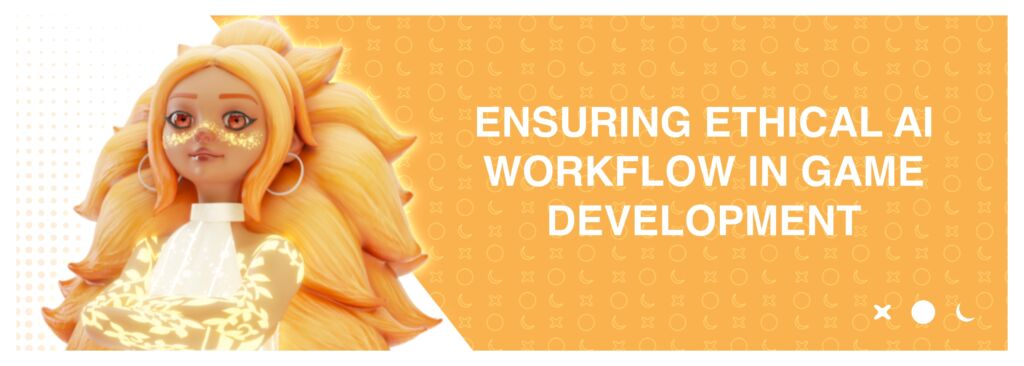We’re living in a new age where AI has infiltrated nearly every aspect of our lives, including the game development industry. Speaking as artists and developers, there’s increasing pressure to produce more content at a faster pace and with lower costs. So, AI has emerged automating many time-consuming tasks. While this progress can seem like a win, it also raises ethical challenges; among them the possibility of AI overtaking the creative process entirely. Unlike the mass transition from traditional art to digital art in around 2013. AI-generated content presents legal and ethical grey areas, especially regarding copyright, since AI models often use databases filled with artists’ copyrighted work.
We believe that human creativity is at the core of great game development, and AI should serve as a tool, never a replacement. Here are the steps we take to ensure AI is used ethically in our creative process:
1. Respecting Privacy
When AI is used in games, it often relies on player data to create personalized experiences. However, this can lead to concerns around privacy, especially when sensitive data like location, personal information, or even credit card details for in-game purchases is collected. Transparency is critical. We need to ensure that AI-driven data collection is minimal and fully disclosed to players. It’s important to gain their consent and guarantee that data is only collected to enhance gameplay, not to invade privacy.
2. Balancing Personalization and Playability
AI can analyze player behaviors and patterns to adjust the difficulty of a game, providing a tailored experience that matches each player’s skill level. While this can enhance engagement, it’s essential to avoid making the game too difficult, creating frustrating experiences instead of enjoyable challenges. AI-driven adjustments must strike a balance; allowing players to grow their skills without hitting walls that feel impossible to overcome. We need to carefully regulate how AI collects and interprets data to keep the gameplay fair and fun.
3. Avoiding Bias and Stereotypes
One of the unpredictable risks of AI is its potential to replicate and amplify cultural biases, political views, or outdated stereotypes. There have been many cases where AI systems generate content that reflects harmful prejudices. As a creative studio, we are committed to lessening these risks. We ensure that AI used in our games draws from curated, culturally sensitive data and stays clear of biased or harmful perspectives. This helps us create experiences that are inclusive, representative, and respectful of diverse players and societies.
4. Preserving Human Creativity
While AI is an amazing tool for enhancing workflow efficiency, it cannot replace the human touch that fuels true creativity. AI can’t teach life lessons, evoke deep emotions, or interpret beauty in the same way a person can. Crafting games is about more than just technical execution; it’s about creating experiences that resonate with players on a personal level. We shouldn’t solely rely on AI for creativity. We believe the magic of game design lies in human imagination and storytelling. with AI only serving as a controlled technical support to bring these ideas to life.
Our Commitment to Ethical AI Use
At Sunnymoon Project, we embrace innovation, but we do so responsibly, as artists, and as humans. We ensure AI enhances our creative process without overshadowing the human element. By prioritizing transparency, balancing AI’s capabilities, avoiding harmful biases, and preserving the importance of human-driven creativity. We create unforgettable gaming experiences that are both ethical and inspiring.
Empowered by light, driven by purpose!☀️
By Dahlia Khodur


